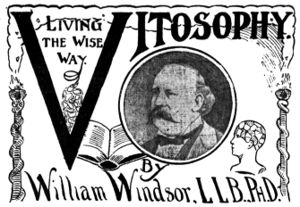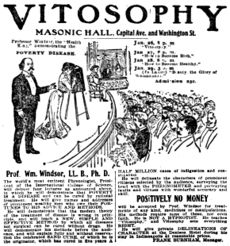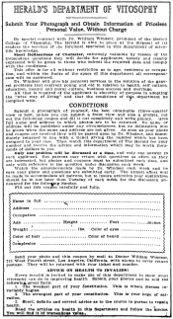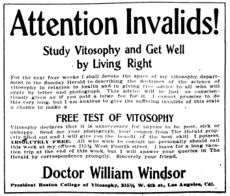Vitosophy
From Kook Science
Vitosophy (portmanteau of the Latin vita, "life", and the Greek sophia, "wisdom": or "The Wisdom of Life", "The Wise Way of Living") is a medico-philosophical school and system of self-improvement, devised and promoted by William Windsor (and his Boston College of Vitosophy) beginning in the late nineteenth century, based heavily on phrenology and general understandings of human genetics (including eugenics) of the period. According to their own copy, Vitosophy is "a scientific system of Character Study and Delineation, a new system of Drugless Healing of all diseases, not surgical, and a complete system of Personal Culture according to standards of exact knowledge of character."[1] Among other principles, the system teaches that there are seven temperaments — Electric, Magnetic, Alkali, Acid, Vital, Motive, and Mental — governing life, and one must abide dietary and lifestyle regimes compatible with these temperaments.
Resources
- Windsor, William (1899), Vitosophy: The Wisdom of Life; Delineation of Character, International College of Science
- Windsor, William (1911), The Solution to the Problem of Human Life According to Vitosophy, "The Wise Way of Living", St. Paul, Minn.: The Vitosophy Press
- Windsor, William (1921), Phrenology, the Science of Character, Big Rapids, Michigan: Ferris-Windsor Company, https://catalog.hathitrust.org/Record/100885872
Advertising
References
- ↑ Ayer, John Edwin (1906), "The Boston College of Vitosophy", Living by Natural Law: An Outline of a Real Synthetic Philosophy Founded upon the Prime Factors of the Universe and the Seven Sense Organisms of the Human Body, Seattle, Wash.: Lowman & Hanford, p. 142, http://www.iapsop.com/ssoc/1906__ayer___living_by_natural_law.pdf



